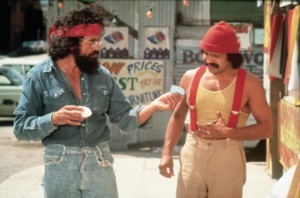Stoner movies a popular film genre despite continuing illegality of weed By Leanne Goodman / Canadian Press
 TORONTO — Marijuana might be illegal, but few other illicit drugs have spawned such a thriving cinematic subculture: stoner movies, comedies that centre on the silly hijinks of pot-addled characters.
TORONTO — Marijuana might be illegal, but few other illicit drugs have spawned such a thriving cinematic subculture: stoner movies, comedies that centre on the silly hijinks of pot-addled characters.
Wednesday’s highly anticipated release of “Pineapple Express,” an adventure film about two stoners played by Seth Rogen and James Franco, represents just the latest in a genre that was pioneered by legendary weed enthusiasts Cheech and Chong.
“People did drugs in movies long before Cheech and Chong,” Richard Crouse, film critic for CTV’s “Canada AM,” said Wednesday.
“There were drug references in movies as early as the 1930s and ’40s but people using drugs in those films were always drug addicts, there was reefer madness, there were huge consequences to doing drugs. But when Cheech and Chong came along in the 1970s, things were changing dramatically, and they were among the first to take drug use in movies to a different level and make it really funny.”
Indeed, Cheech Marin and Tommy Chong blazed a trail for a long string of stoner movies that include classics ranging from “Fast Times at Ridgemont High” – featuring one of the best stoner characters ever in Sean Penn’s Jeff Spicoli – to “Half-Baked,” “Dazed and Confused,” “The Big Lebowski,” “Clerks” and the popular “Harold and Kumar” movies, to name just a few.
In every one of these films, pot-smoking is largely portrayed as a relatively innocuous pastime that simply results in a lot of silly – and often hilarious – behaviour.
“There are not a lot of funny heroin movies out there, nor a lot of funny crystal meth movies,” says Crouse. “Marijuana is certainly easier to poke fun at, and it’s because pretty much everyone of a certain generation now believes that smoking a joint is a fairly harmless thing to do. Hollywood pretty much equates smoking pot with having a Scotch.”
Heather Watson, a pop culture blogger (cvxn.tumblr.com) and city editor of the BlackBook guide to Vancouver, adds that pot smoking in films is becoming even more acceptable than cigarette smoking and boozing.
“You can’t have a movie with an unrepentantly drunk character in the way you can have an unrepentant stoner character. It’s an interesting shift, kind of like you can’t have a hero that smokes cigarettes anymore in most things, and yet pot is OK,” says Watson, who describes herself as a member of Vancouver’s “weederati.”
“As a drug, pot is pretty G-rated, and the consequences of its use are – especially lately – comedic and not at all life-threatening. At worst in these films, society gets its pants pulled down in the town square by the lovable loser armed with no weapon save a thick cloud of sweet smoke and a fit of the giggles.”
Stoner movies often have subtle social messages, Crouse adds, that can be even more effective than those in heavy-handed dramatic films.
He cites the “Harold and Kumar” movies and their pointed – but still funny – commentary on everything from prejudice, racial profiling and the frightening realities of post-9-11 America.
“There is real commentary in the ‘Harold and Kumar’ movies – particularly the second one, ‘Harold and Kumar Escape From Guantanamo Bay.’ They delve into race relations in America and how the war on terror has really spiralled out of control, and they’ve been far more effective in terms of communicating that stuff than an earnest film like ‘Lions for Lambs’ was. And many more people saw the ‘Harold and Kumar’ movies than ‘Lions for Lambs.”‘
Watson believes there’s even substance for the lofty intellectual to chew on in an outwardly goofy stoner flick.
“If you want to look really closely at a clown character like Jeff Spicoli, you’ll see roots in commedia dell’arte and the archetype of the fool who speaks the truth when others can’t see it,” she says.
“I’ve been watching stoner movies since long before I was a stoner, and ultimately I suppose they are about boring stuff like ‘codified communications’ and ‘re-drawing the paradigms of polite discourse’ in less threatening ways than aggressively laddish movies like ‘Jackass.”‘
Which brings Watson to her next point.
“The bigger question that remains unasked here is where are all the lady stoner flicks? Pardon the pun, but isn’t it high time for a female Cheech and Chong?”
Leave a Reply
You must be logged in to post a comment.
